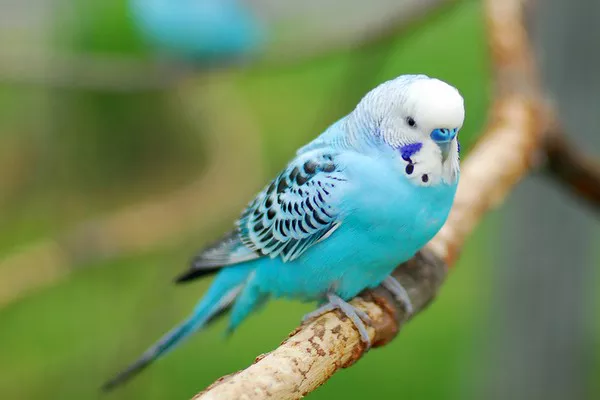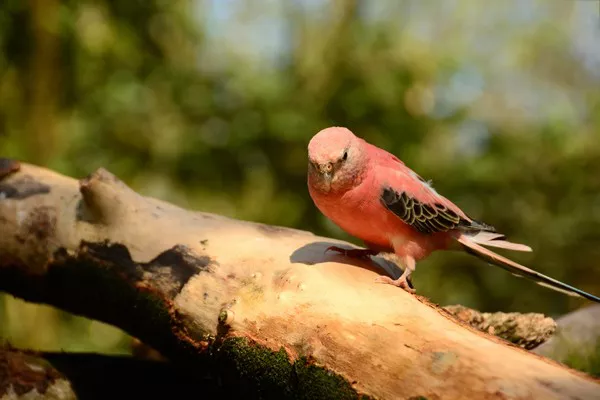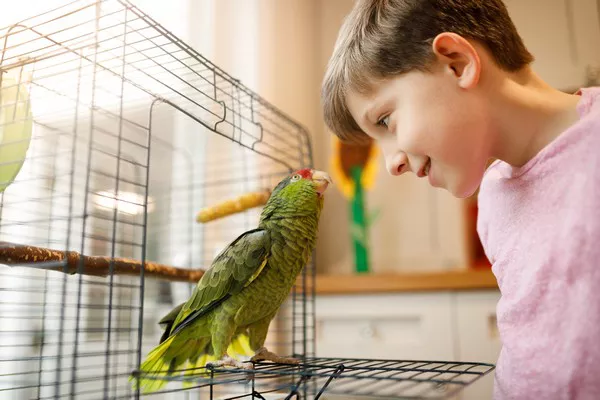Sun Conures, known for their vibrant colors, playful nature, and friendly disposition, are beloved pet birds among avian enthusiasts. As with any pet, feeding them a healthy, balanced diet is essential to their well-being. In this article, we will explore whether bananas are safe for Sun Conures, the benefits and potential risks associated with feeding them this fruit, and general guidelines on how to incorporate bananas and other fruits into their diet.
1. Introduction to Sun Conures and Their Dietary Needs
Sun Conures are small to medium-sized parrots, native to northeastern South America. Their natural diet in the wild primarily consists of fruits, nuts, seeds, and occasionally insects. This diversity helps meet their nutritional needs, which include essential vitamins, minerals, fats, and proteins. As pets, it is crucial to replicate this balanced diet to ensure their health and happiness.
In captivity, Sun Conures thrive on a diet that consists of high-quality pellet foods, seeds, fresh fruits, and vegetables. Pellets should make up around 60-70% of their diet, as they are specifically formulated to meet the nutritional needs of parrots. Fresh fruits and vegetables can make up about 20-30% of their diet, offering them variety, taste, and additional nutrients.
2. Can Sun Conures Eat Bananas?
The simple answer is yes, Sun Conures can eat bananas, and they are generally considered a safe and healthy fruit for these parrots. Bananas are easy to digest, have a pleasant sweetness that many Sun Conures enjoy, and provide several beneficial nutrients.
That said, while bananas are safe for Sun Conures, they should be fed in moderation as part of a varied diet. Bananas contain natural sugars, which can contribute to weight gain if overconsumed. Therefore, while they make a great treat or supplement, they should not become a staple or primary food source.
3. Benefits of Bananas for Sun Conures
Bananas offer several nutritional benefits that can contribute to the health and well-being of your Sun Conure:
High in Essential Vitamins and Minerals
Bananas are rich in vitamins and minerals, including:
Vitamin B6: Supports metabolism, promotes energy production, and aids in brain health.
Vitamin C: Acts as an antioxidant, boosts the immune system, and supports skin and feather health.
Potassium: Essential for maintaining proper nerve and muscle function, including the heart.
Energy Source
The natural sugars in bananas (like glucose, fructose, and sucrose) provide an energy boost that can be beneficial for Sun Conures. These sugars are easily digestible and can offer quick energy, especially useful for active birds that enjoy flying and playing.
Fiber for Digestive Health
Bananas contain dietary fiber, which supports digestive health by regulating bowel movements and promoting a healthy gut microbiome. A balanced gut can lead to better nutrient absorption and overall improved health.
Moisture Content
Bananas have a high water content, which helps keep Sun Conures hydrated, especially when they may not drink as much water as they need. Proper hydration is crucial for overall health, particularly for the functioning of the kidneys and other organs.
Antioxidants
Bananas contain various antioxidants, which help combat free radicals and reduce oxidative stress in the body. This can support your Sun Conure’s immune system and prevent cellular damage, promoting longevity and overall vitality.
4. Potential Risks of Feeding Bananas to Sun Conures
Although bananas are generally safe and beneficial, there are some potential risks to be aware of:
High Sugar Content
The natural sugars in bananas, while a good energy source, can pose a risk if fed in excess. High sugar intake can lead to obesity, liver issues, and diabetes in parrots. Overweight Sun Conures are also more prone to developing joint problems and cardiovascular issues.
Calcium to Phosphorus Ratio
Bananas have a higher phosphorus content than calcium. In birds, a proper balance of calcium and phosphorus is necessary for bone health and metabolic function. Too much phosphorus in the diet can lead to calcium deficiency, resulting in weaker bones and potential health problems.
Pesticide Residue
Non-organic bananas may contain pesticide residues on their skins, which could be harmful if ingested. While it’s less likely that a Sun Conure would consume banana peel, it’s best to wash or remove the peel before offering bananas to your bird.
Risk of Becoming a Dietary Staple
If a Sun Conure develops a preference for bananas, it may refuse other, more nutrient-dense foods. A diet primarily composed of bananas can lead to nutrient imbalances, as bananas do not provide a complete profile of necessary vitamins, minerals, and proteins.
5. How to Feed Bananas to Sun Conures
Here are some simple guidelines on how to safely incorporate bananas into your Sun Conure’s diet:
Serve in Moderation
Offer bananas as an occasional treat rather than a daily staple. Feeding a small slice of banana (about 1/4 to 1/2 inch) a few times a week is sufficient.
Cut into Small Pieces
Slice or dice bananas into small, manageable pieces for your Sun Conure to pick up and eat. This helps prevent choking and allows the bird to explore and enjoy the food in bite-sized portions.
Offer Alongside Other Fruits and Veggies
Mixing bananas with other fruits and vegetables provides variety and ensures that your Sun Conure is not consuming too much of one food type. This approach helps maintain a balanced intake of nutrients.
Avoid Banana Peels
If you decide to feed banana peels, make sure they are thoroughly washed and come from organic bananas to avoid pesticide residues. However, most experts recommend removing the peel entirely.
Observe for Any Adverse Reactions
If you are introducing bananas to your Sun Conure for the first time, observe for any unusual behavior or digestive upset. While rare, some birds may have sensitivities to certain foods.
6. Other Fruits That Are Safe for Sun Conures
In addition to bananas, several other fruits are safe and nutritious for Sun Conures. Here is a list of fruits you can add to your Sun Conure’s diet for variety:
- Apples (remove seeds, which contain cyanide)
- Grapes (in moderation, as they are also high in sugar)
- Oranges (only occasionally, as they are acidic)
- Blueberries
- Pineapple (small amounts due to acidity)
- Papaya
- Mango
- Kiwi
- Melons (like cantaloupe, honeydew, and watermelon)
These fruits contain vitamins and antioxidants that benefit your Sun Conure’s health. Make sure to wash and cut them into appropriate sizes, and always remove any seeds or pits that could be toxic or pose a choking hazard.
7. Fruits to Avoid in a Sun Conure’s Diet
Certain fruits are harmful to parrots and should never be fed to Sun Conures:
Avocado: Contains persin, a compound toxic to birds and can be fatal.
Cherry, Plum, Peach, Apricot Pits: These contain cyanide compounds and are dangerous.
Rhubarb: Contains oxalic acid, which can be toxic to birds.
Grapefruit and Lemon: The high acidity can upset their stomachs if fed too often.
Always consult a veterinarian if you’re unsure about a particular fruit, as some fruits may contain hidden toxins that could harm your bird.
8. Creating a Balanced Diet for Your Sun Conure
The ideal diet for a Sun Conure consists of:
Pelleted Food: Makes up about 60-70% of their diet, providing essential nutrients in a balanced format.
Fresh Fruits and Vegetables: Comprise 20-30% of their diet. Offer a variety of fruits like bananas, apples, and berries, along with vegetables like leafy greens, carrots, and bell peppers.
Seeds and Nuts: About 5-10% of their diet, given as treats rather than a staple due to their high fat content.
Occasional Protein: Small amounts of cooked egg or legumes can provide protein, but these should be rare treats.
A variety of foods helps prevent boredom and encourages natural foraging behavior. Additionally, regular access to clean, fresh water is essential to keep your bird hydrated and healthy.
Conclusion
Bananas are a safe and nutritious addition to your Sun Conure’s diet when fed in moderation. They provide vitamins, minerals, fiber, and antioxidants that contribute to your bird’s health and energy levels. However, due to their natural sugar content, bananas should be considered a treat and not a primary dietary component.
By combining bananas with other fruits, vegetables, high-quality pellets, and the occasional seeds or nuts, you can create a balanced diet that meets all the nutritional needs of your Sun Conure. Remember, a healthy diet contributes significantly to the long-term well-being of your bird, helping them live a long, happy, and vibrant life as part of your family.
Always consult an avian veterinarian for personalized advice regarding your pet’s diet, especially if you notice any signs of discomfort or health issues. With the right care and attention to their nutritional needs, your Sun Conure will thrive in your home, enjoying a variety of delicious and healthy foods.
Related Topics:























